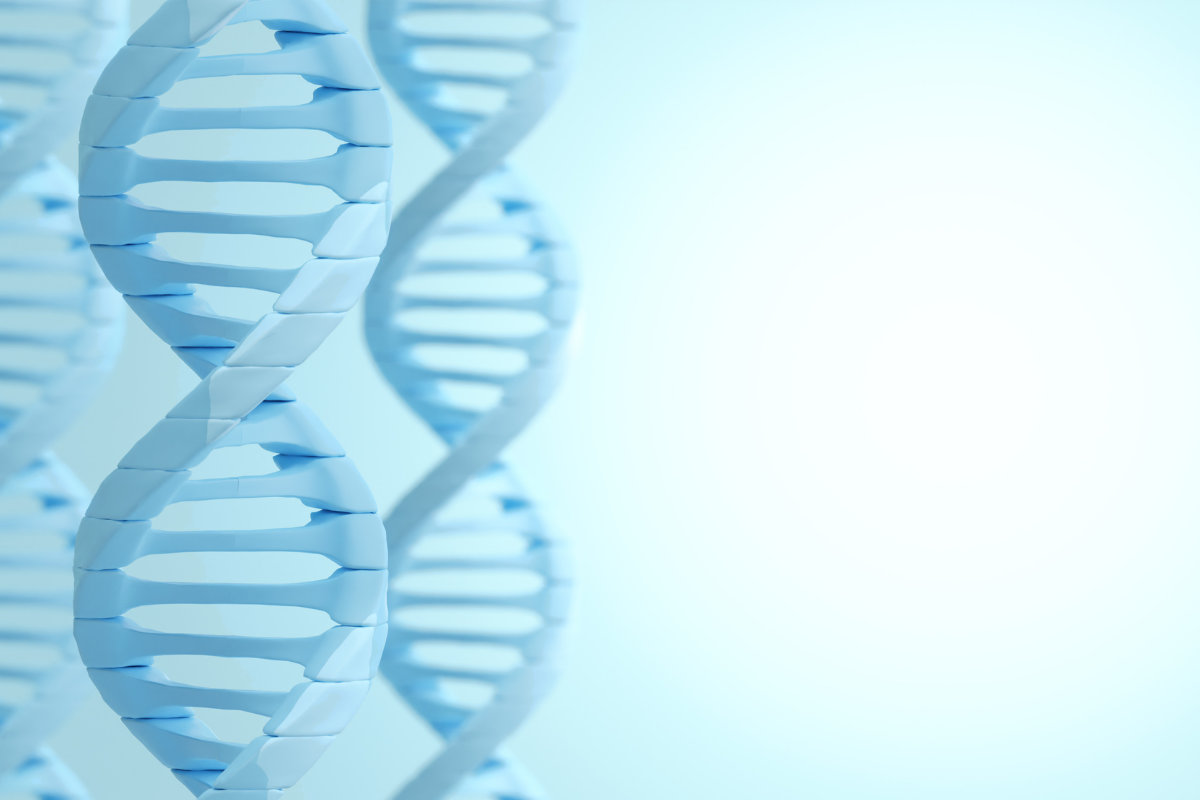The ageing process has long intrigued scientists and researchers. In our eternal quest for youth and longevity, a new branch of science, epigenetics, is shedding new and promising light. This fascinating field studies how our lifestyles, our environment and even our thoughts can influence the expression of our genes without altering their DNA sequence. In this article, we explore how epigenetics influences ageing and how understanding these mechanisms can help us reverse or slow down the signs of time. We’ll delve into a world where science is no longer just about genes, but also about their expression and repair, opening doors to better health and perhaps, the much sought-after fountain of youth.
What is epigenetics?
Epigenetics refers to the chemical modifications that regulate gene expression without changing the DNA sequence itself. These modifications play a crucial role in cell differentiation and function. The study uses a system called ICE(Inducible Changes to the Epigenome) to simulate epigenetic changes in mice and observe their impact on ageing.
One example of these changes is DNA methylation, a process in which small chemical groups are added to DNA, thereby influencing gene activity without modifying the DNA sequence itself. This methylation is like putting special marks on certain parts of the DNA, which can ‘switch off’ or ‘switch on’ certain genes, playing an essential role in our health and development.
The impact of epigenetics on ageing
One of the major advances in this study was the use of the ICE (Inducible Changes to the Epigenome) method, which enabled temporary breaks to be made in the DNA of mice. This innovative approach had a key specificity: it targeted areas of the DNA that were not directly involved in gene coding. The aim was to isolate the effect of epigenetic changes on ageing, without altering the underlying genetic code of the animals.
Accelerated signs of ageing
The results were more than surprising. After undergoing induced breaks in their DNA, the mice began to show accelerated signs of ageing. This was measurable not only at the behavioural and physiological level, but also at the cellular level. Biomarkers associated with ageing, such as inflammation and cellular senescence, increased significantly.
Cellular senescence is the process by which a cell stops dividing. As we age, more and more cells enter senescence, which can contribute to the ageing of the body and the onset of age-related diseases.
Disruption of epigenetic markers
What is striking is that this acceleration in ageing was directly correlated with disturbances in the epigenetic markers of the mice. These changes were not due to errors in the genetic code but to changes in the way this code was regulated. This led to defects in the function of tissues and organs, confirming the hypothesis that epigenetics plays a crucial role in ageing.
Tissue degradation and organ function
The disruption of epigenetic markers has not only caused visible signs of ageing. It also led to rapid degradation of the mice’s tissues and organ functions. For example, muscle tissue showed signs of weakness and atrophy, and kidney function was also affected. These observations underline the profound impact that epigenetic modifications can have on the overall health of an organism.
Towards a reversal of ageing
In the fascinating pursuit of eternal youth, the next part of our article focuses on the most revolutionary aspect of the recent study: the possibility of reversing the effects of ageing through advances in cellular rejuvenation.
1. Reversibility of epigenetic changes
The highlight of the study is the discovery that the epigenetic changes observed are not irreversible. Using a gene therapy approach, the researchers were able to reset these epigenetic markers, leading to functionally younger cells.
2. Use of the OSK gene cocktail
The experimental protocol involved the use of a cocktail of genes – Oct4, Sox2 and Klf4, abbreviated as OSK. These genes were carefully selected for their ability to reprogram somatic cells into pluripotent stem cells (Pluripotent stem cells are cells capable of transforming into any cell type in the body. This property makes them particularly interesting for research into ageing and cell regeneration). When administered together, they were able to ‘reboot’ the cells to a younger state, effectively reversing some of the epigenetic damage accumulated over time.
Gene therapy involves introducing genes into cells to treat or prevent disease. In the context of ageing, it could be used to replace or repair damaged genes, offering a potential strategy for reversing the signs of ageing.
3. Measurable cellular rejuvenation
Confirmation of this rejuvenation is not based solely on epigenetic markers. Treated cells showed clear signs of youthfulness on a number of levels, including improved metabolic efficiency, reduced levels of inflammation, and improved cell function reduced levels of inflammation and an increased capacity to divide and regenerate. This series of consistent results strongly supports the validity of this revolutionary approach.
Implications and prospects
The shockwave caused by this breakthrough in our understanding of epigenetics and ageing has the potential to completely reshape our approach to age-related diseases and healthcare in general. The implications are vast and manifold.
- Firstly, if this discovery is effectively translated into clinical applications, we could see a revolution in the way we treat age-related diseases, such as cardiovascular disease diabetes type 2 or neurodegenerative disorders such as Alzheimer’s disease. Rather than targeting the symptoms of these diseases, treatments could be aimed at the underlying cause, i.e. cellular ageing itself.
- Secondly, this research could change our perception of ageing, by no longer seeing it as an irreversible process, but rather as a biological state that can in theory be controlled and even reversed. This could have a profound impact on the quality of life of the elderly, extending not only longevity but also the period during which an individual can live in good health.
- Thirdly, advances in the field of epigenetics offer tangible hope of developing more targeted and personalised therapies. By understanding the epigenetic mechanisms that contribute to ageing, it will be possible to create specific interventions for each individual, based on their unique epigenetic profile.
Nevertheless, it should be noted that we are still in the early stages of this scientific exploration. Further studies on larger mammals and even clinical trials on humans will be needed to validate these discoveries. The ethical and regulatory challenges associated with manipulating the epigenome will also need to be carefully considered.
Precautions and future steps
Although the implications of these discoveries are staggering, it is crucial to approach the precautions and future steps with rigour and pragmatism.
- Firstly, the current stage of research is still experimental and largely limited to animal models. Clinical trials on human subjects will have to be conducted to assess not only the efficacy of these interventions, but also their safety. Despite their potential, gene therapies carry risks of undesirable effects or even unforeseen complications.
- Secondly, the exact mechanism by which the OSK gene cocktail induces cell rejuvenation remains to be elucidated. Further studies are therefore needed to understand the various biological pathways and molecular mechanisms involved. This information is crucial for optimising the therapy and minimising potential side effects.
The potential advantage of this research is that epigenetic molecules are often easier to manipulate than genetic mutations. This means that we could have at our disposal more effective and targeted therapeutic approaches against age-related diseases. However, we must remain cautious, as these concepts need to be rigorously validated in animal models closer to humans, such as primates, and eventually in human clinical trials.
In addition, the ethical aspect of these interventions must not be overlooked. The possibility of manipulating the epigenome raises complex questions about informed consent, equity of access to therapies and even extreme longevity and its societal implications.
Can we reverse the ageing process?
Current research into epigenetics and ageing does not stop with this fascinating study. In fact, it is part of a wider body of scientific work that has also explored ways of slowing or even reversing ageing.
Telomere research
Previous work on telomeres and telomerase has also outlined ways of reversing ageing. The researcher Elizabeth Blackburn and her colleagues were awarded a Nobel Prize for highlighting the role of telomerase in restoring telomere length, offering another route to reversing ageing.
The role of Sirtuins
David Sinclair also involved in the study of epigenetics, was a pioneer in research into sirtuins, proteins that regulate longevity and the cellular response to stress. Sirtuins therefore represent another promising area of research for reversing ageing.
Intermittent fasting and calorie restriction
Studies on the benefits of intermittent fasting and calorie restriction have also demonstrated beneficial effects on longevity and the reduction of age-related diseases. Interestingly, these interventions appear to act via epigenetic pathways.
Towards immortality or catastrophe? The ethical issues involved in longevity research
Beyond the astonishing scientific advances that this research suggests, it is crucial to examine the societal and ethical implications inherent in manipulating human longevity.
Access and inequalities
Firstly, the accessibility of these treatments poses a major ethical challenge. Who would have access to these potentially revolutionary therapies? Is there a risk of widening the gap between wealthy individuals who can afford rejuvenation treatments and those who cannot?
Demographic impact
The significant increase in human longevity could have major demographic repercussions. An ageing but healthier population would require an overhaul of pension systems, employment policies and even traditional family structures.
Environmental consequences
There are also questions about the environmental impact of a human population that lives longer. Resources are already limited, and an increase in longevity could exacerbate the problems associated with climate change, loss of biodiversity and waste management.
The ethics of genetic manipulation
The ethics of genetic manipulation itself also need to be considered. The possibilities of ‘rebooting’ cells to a younger state could open the door to other forms of genetic manipulation, raising questions about the very essence of what it means to be human.
Conclusion
To sum up, epigenetics is a revolutionary field in our understanding of ageing. It reveals that our lifestyle, our daily choices and our environment have a profound impact on the expression of our genes. This science offers us the hope that, through appropriate and targeted modifications, we can not only slow down the ageing process, but also improve our overall quality of life. Epigenetics reminds us that, although we cannot change our DNA, we do have the power to influence how it is expressed in our bodies.
A call to action
Curious to find out more and discover how you can incorporate this knowledge into your daily life? Subscribe to our newsletter to receive regular advice, in-depth articles and the latest discoveries in health and well-being. Plus, feel free to visit our online shop at Soin-et-Nature. com to explore our range of natural products that can help you take care of your health holistically. Join us on this exciting journey towards a healthier, more fulfilled life.
FAQ
What is epigenetics?
Epigenetics studies changes in gene expression that are not due to changes in the DNA sequence.
How does epigenetics influence ageing?
According to a study by Sinclair and his team, disturbed epigenetic markers can accelerate the ageing process. Damage to tissues and bodily functions.
What is OSK gene therapy?
It’s a cocktail of genes (Oct4, Sox2, Klf4) used to ‘reboot’ cells to a younger state. This reverses the signs of ageing.
Are the results definitive?
No, the discoveries are still at an experimental stage and clinical trials on humans are necessary.
What are the implications of this study?
This research could revolutionise anti-ageing treatments and life-extension therapies. It could also offer new approaches to age-related diseases.
What are the next steps?
The studies need to be extended to larger mammals and humans to confirm these results. In addition, the exact mechanism by which this cocktail of genes works requires further research.
Is there any other similar research?
Work on telomerase or calorie restriction has also shown effects on ageing. However, manipulating epigenetic markers could be more effective.
Source:
- https://www.ncbi.nlm.nih.gov/pmc/articles/PMC1693310/
- https://pubmed.ncbi.nlm.nih.gov/35310455/
- https://hms.harvard.edu/news/loss-epigenetic-information-can-drive-aging-restoration-can-reverse
- https://www.cell.com/cell/fulltext/S0092-8674(22)01570-7
- medicine/science – “Epigenetics and ageing
- This source discusses the chemical modifications that regulate gene expression without changing the DNA sequence, in particular the methylation of DNA CpG pairs and their link with ageing. She mentions the existence of an ‘epigenetic age’ correlated with chronological age, highlighting the impact of methylation on the quality of ageing.
- Institut Pasteur – “The epigenetic effects of immunity and ageing have been quantified”
- This study, carried out by researchers from the Institut Pasteur, the CNRS, the Karolinska Institute and the University of British Columbia, examined the epigenetic effects of age and a common virus infection on a cohort of almost 1,000 healthy patients. The study highlights the importance of epigenetics in human health, with particular reference to DNA methylation and its role in cell differentiation and the development of certain diseases such as cancer.
- European Commission – “Life before death: the epigenetics of ageing”
- This project, named IDEAL and funded by the EU, studied the role of epigenetics in ageing, including before birth. It showed how factors such as nutrition, infections, hormone treatments and assisted reproduction techniques affect DNA and chronic diseases. The study also revealed the plasticity of physiological systems and proposed potential biomarkers for research into ageing and certain diseases.





